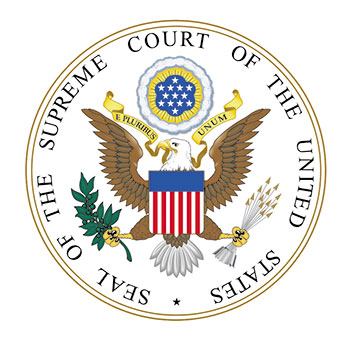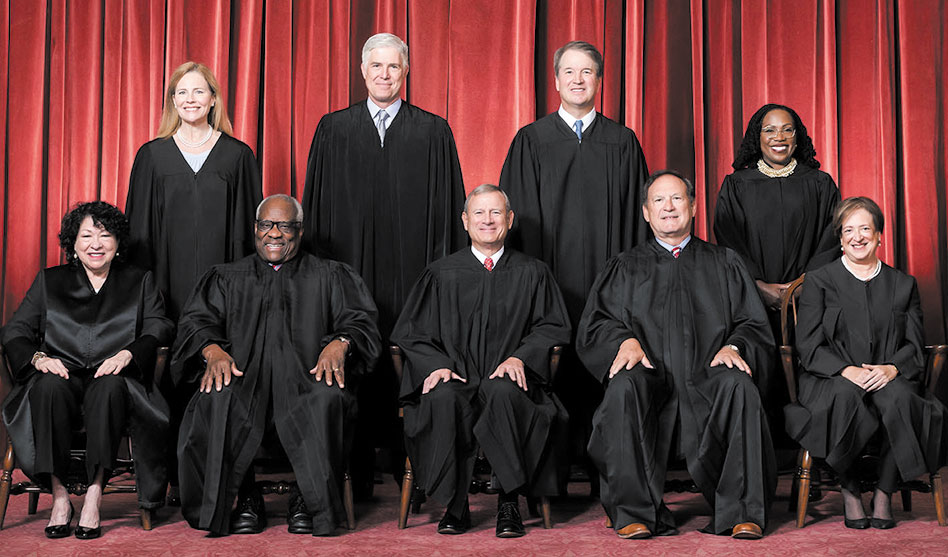So far rulings are positive on LGBTQ issues, but there’s more to come
LISA KEEN | Keen News Service
lisakeen@mac.com
More than half-way through its 2023-24 session, the U.S. Supreme Court has dispensed with three appeals in ways that help LGBTQ people. But as many as seven other petitions are awaiting action before the justices.
On March 26 as the U.S. Supreme Court hears oral arguments in two consolidated appeals to determine whether courts can pull the early-stage abortion drug RU-486 (aka mifepristone) off the market.
 Lambda Legal and other LGBTQ groups have long warned that any damage done to the right to have an abortion could have deep implications for the right to have intimate relations, including marriage, for LGBTQ people. How the high court rules in the mifepristone case (Food and Drug Administration v. Alliance for Hippocratic Medicine) could negatively impact the availability of HIV prevention medication, IVF services for lesbian couples and medical treatment for transgender people.
Lambda Legal and other LGBTQ groups have long warned that any damage done to the right to have an abortion could have deep implications for the right to have intimate relations, including marriage, for LGBTQ people. How the high court rules in the mifepristone case (Food and Drug Administration v. Alliance for Hippocratic Medicine) could negatively impact the availability of HIV prevention medication, IVF services for lesbian couples and medical treatment for transgender people.
In an apparent 6-2 vote last year, the justices temporarily blocked enforcement of a lower court decision in Texas that sought to pull RU-486 off the market.
The legal questions at the Supreme Court will focus narrowly on whether doctors who oppose abortion have legal standing to challenge an FDA approval of RU-486 to terminate pregnancies even though the doctors do not prescribe the drug themselves.
Other LGBTQ-related cases before the Supreme Court this session — some concluded, some pending — include:
• Campus hate speech: Good, for now. In what appears to have been a 6-2 vote, the Supreme Court on March 3 granted a petition of appeal challenging a policy against hate speech on the campus of Virginia Tech. Without argument, the court vacated the Fourth Circuit U.S. Court of Appeals decision with instructions to dismiss the lawsuit as moot (because the school had significantly pared back its protocol for addressing hate speech on campus). There are numerous attempts by universities around the country to create policies to tamp down hate speech. Justice Clarence Thomas, with his plus one, Justice Samuel Alito, dissented. (Speech First v. Virginia Tech)
• Bathroom ban: Good. On Jan. 16, without comment or dissent, the Supreme Court denied a request from an Indiana school district which sought to require transgender students to use a separate bathroom from other students. (Martinsville v. A.C.)
• Conversion therapy: Good. In a 6-3 vote, the U.S. Supreme Court on Dec. 11 rejected the appeal of a therapist who challenged a Washington State law prohibiting “conversion therapy” for anyone under 18. (Tingley v. Washington)
• Fighting bathroom ban. Pending. Three transgender adolescents in Tennessee have filed an appeal with the Supreme Court, seeking to reverse a Sixth Circuit ruling that upheld a ban on gender-affirming medication. (L.W. v. Tennessee)
• Pronoun v. Parents. Pending. A couple in Indiana say their Christian beliefs hold that God “creates each person as immutably male or female,” and they refuse to refer to their “biological male” child with female pronouns as the child wishes. The Indiana Department of Child Services removed the child from the parents’ home, noting the child had developed an eating disorder as a result of the conflict with the parents, and state courts, including the Indiana Supreme Court, upheld that action. The child has since turned 18, potentially rendering the case moot. (M.C. v. Indiana)
• Fighting for parental rights. Pending. In this appeal, the ACLU and the National Center for Lesbian Rights is challenging a state law passed last year by Kentucky to ban the use of medical treatments to alter the appearance of a minor from the gender the child was identified at birth to the gender the child identifies with now. (Jane Doe 1 v. Kentucky)
• Fighting treatment. Pending. Idaho has asked the Supreme Court for an emergency stay of a lower court decision preventing the state from enforcing its ban on medical treatment for transgender youth. (Idaho v. Poe)
• Reverse discrimination. Pending. A straight woman in Ohio is appealing her case to seek a declaration of sexual orientation discrimination when the supervisor at her job twice passed her over for promotions and chose gay employees instead. The straight employee was eventually fired by two straight employees. (Ames v. Ohio).
© 2024 Keen News Service. All rights reserved.
















